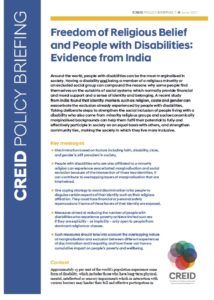This Working Paper by Dilmurad Yusupov explores how intersecting identities based on disability, ethnicity and religion impact the wellbeing of deaf Uzbek Jehovah’s Witnesses in post-Soviet Uzbekistan. By analysing the collected ethnographic data and semi-structured interviews with deaf people, Islamic religious figures, and state officials in the capital city Tashkent, it provides the case of how a reaction of a majority religious group to the freedom of religious belief contributes to the marginalisation and exclusion of religious deaf minorities who were converted from Islam to the Jehovah’s Witnesses.
he paper argues that the insensitivity of the dominant Muslim communities to the freedom of religious belief of deaf Uzbek Christian converts excluded them from their project activities and allocation of resources provided by the newly established Islamic Endowment Public charity foundation ‘Vaqf’. Deaf people in Uzbekistan are often stigmatised and discriminated against based on their disability identity, and religious inequality may further exacerbate existing challenges, lead to unintended exclusionary tendencies within the local deaf communities, and ultimately inhibit the formation of collective deaf identity and agency to advocate for their legitimate rights and interests.
Citation
Yusupov, D. (2021) Deaf Uzbek Jehovah’s Witnesses: The Case of Intersection of Disability, Ethnicand Religious Inequalities in Post-Soviet Uzbekistan, CREID Working Paper 8, Coalition for Religious Equality and Inclusive Development, Brighton: Institute of Development Studies, DOI: 10.19088/CREID.2021.008

